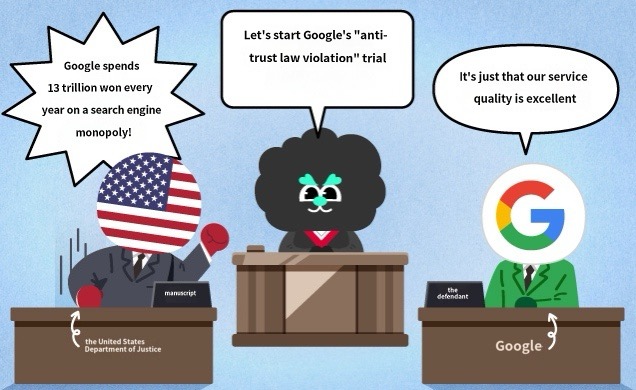
Judge Amit Mehta of the federal court in Washington, D.C. on the 5th (local time) made the decision, saying Google’s parent company Alphabet paid $26 billion (about 35.6 trillion won) to the smartphone maker to block fair competition from other companies. Google, which occupies 90% of the global Internet search market, has abused its market power to prevent competitors from entering the market.
Judge Mehta said in a 276-page ruling, “Google’s payment to set its search engine to default on its smartphone web browser is a violation of the U.S. anti-trust law.” “The $26 billion Google paid effectively blocked other competitors from succeeding in the market,” he said. “Google’s exclusive search contract on Apple devices such as Android and iPhone is an anti-competitive act, helping to solidify its dominance in the search market.”
“Google is a monopoly and has acted like a monopoly to maintain its monopoly,” Judge Mehta said in the ruling.
Earlier, the U.S. Department of Justice filed a complaint against Google in October 2020, saying it violated anti-trust laws by establishing overwhelming market power. According to the Ministry of Justice, Google has paid billions of dollars to each smartphone manufacturer over a decade to gain an edge in the search engine market, generating more than $300 billion (about 411 trillion won) in search advertisement sales annually. The Ministry of Justice claims that such actions have hindered fair competition and limited consumer options.

Google, on the other hand, has countered that users have only chosen a better search service.
The lawsuit received great attention in that it is the largest anti-trust lawsuit against Big Tech in more than 20 years after the U.S. government filed a lawsuit against Microsoft, which dominated the browser market with the Windows operating system. It also drew attention in that Google’s fate depends on the outcome of the trial as it may have to separate its businesses.
In addition, other companies have been closely watching the results of the lawsuit as it could affect anti-trust lawsuits filed by the U.S. Department of Justice against other big tech companies. In March, the U.S. Department of Justice filed a lawsuit against Apple for violating anti-trust laws as a closed ecosystem that only allows its apps on iPhones and limits compatibility on other devices.
JULIE KIM
US ASIA JOURNAL



